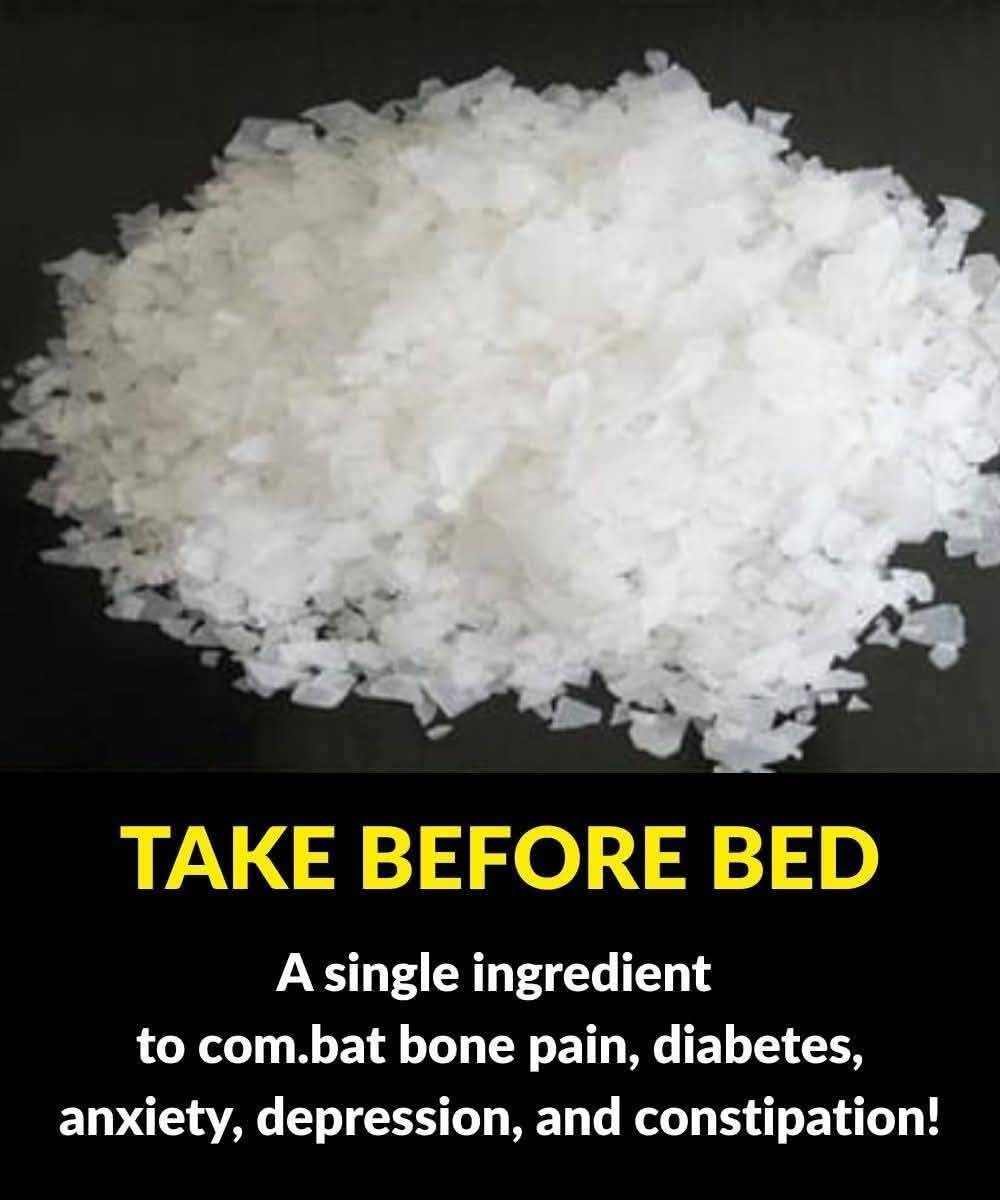A single ingredient to combat bone pain, diabetes, anxiety, depression, and constipation
In the quest for better health, many people turn to complex supplements or medications. However, one single ingredient has been quietly working wonders: magnesium. This essential mineral is involved in over 300 enzymatic reactions in the human body, making it a powerhouse nutrient for maintaining overall wellness. From alleviating bone pain to managing diabetes, reducing anxiety and depression, and easing constipation, magnesium proves that sometimes simplicity is key.
This article explores how magnesium can address these common health concerns and how you can use it effectively to improve your well-being.
What Is Magnesium?
Magnesium is an essential mineral found naturally in foods like leafy greens, nuts, seeds, whole grains, and legumes. It plays a critical role in numerous bodily functions, including energy production, muscle function, nerve regulation, and bone health. Despite its importance, studies show that many people are deficient in magnesium due to poor dietary habits, soil depletion, and modern lifestyles.
A deficiency in magnesium can lead to a host of issues, including fatigue, muscle cramps, mood swings, and digestive problems. Fortunately, supplementing with magnesium—or increasing dietary intake—can help combat these symptoms and promote long-term health.
How Magnesium Helps Combat Common Health Issues
Alleviates Bone Pain
Magnesium is a key player in maintaining strong, healthy bones. It works alongside calcium and vitamin D to support bone density and prevent conditions like osteoporosis. Without adequate magnesium, bones may become brittle and prone to fractures or chronic pain.
How It Works: Magnesium activates vitamin D, which is necessary for calcium absorption. It also helps regulate parathyroid hormone (PTH), ensuring proper calcium distribution in the bones.
How to Use It: For bone pain, consider taking magnesium citrate or glycinate supplements daily. Pair this with a diet rich in magnesium-rich foods like spinach, almonds, and avocados.
Manages Diabetes
Magnesium plays a crucial role in glucose metabolism and insulin sensitivity, making it especially beneficial for individuals with type 2 diabetes or those at risk of developing the condition.
How It Works: Low levels of magnesium are linked to insulin resistance, which can exacerbate blood sugar imbalances. Supplementing with magnesium has been shown to improve insulin sensitivity and lower fasting blood glucose levels.
How to Use It: Incorporate magnesium-rich foods into your diet, such as pumpkin seeds, dark chocolate, and quinoa. Alternatively, consult your doctor about adding a magnesium chloride or malate supplement to your routine.
Reduces Anxiety and Depression
Magnesium is often referred to as “nature’s chill pill” because of its calming effects on the nervous system. It regulates neurotransmitters and supports the production of serotonin, the “feel-good” hormone.
How It Works: Magnesium blocks NMDA receptors in the brain, reducing excitatory signals that contribute to anxiety and stress. It also promotes relaxation by activating GABA pathways, which induce calmness.
How to Use It: Magnesium L-threonate is particularly effective for mental health due to its ability to cross the blood-brain barrier. Take it before bed for improved sleep quality and reduced anxiety. Additionally, Epsom salt baths (rich in magnesium sulfate) can provide soothing relief.
Eases Constipation
If you’ve ever struggled with occasional constipation, magnesium might be your new best friend. Known for its natural laxative properties, magnesium draws water into the intestines, softening stool and promoting regular bowel movements.
How It Works: Magnesium relaxes the muscles of the digestive tract while attracting moisture to aid in digestion.
How to Use It: Magnesium citrate is widely used for relieving constipation. Start with a low dose and increase gradually as needed. Be sure to drink plenty of water to enhance its effectiveness.
The Benefits of Magnesium Are Far-Reaching
Beyond addressing specific conditions, magnesium offers general health benefits that make it indispensable:
Supports Heart Health: Magnesium helps maintain normal heart rhythm and reduces the risk of hypertension.
Boosts Energy Levels: By aiding ATP production (the body’s primary energy molecule), magnesium combats fatigue and boosts vitality.Promotes Better Sleep: Its calming effect on the nervous system makes magnesium ideal for improving sleep quality.
How to Incorporate More Magnesium Into Your Life
Adding more magnesium to your life doesn’t have to be complicated. Here are some practical tips:
Dietary Sources:
Leafy greens (spinach, kale)
Nuts and seeds (almonds, pumpkin seeds, sunflower seeds)
Whole grains (brown rice, oats)
Legumes (black beans, chickpeas)
Dark chocolate
Supplements: Choose a form of magnesium based on your needs:
Magnesium Glycinate: Best for relaxation and sleep.
Magnesium Citrate: Ideal for constipation relief.
Magnesium L-Threonate: Excellent for cognitive support.
Magnesium Chloride: Great for overall supplementation.
Topical Applications: Magnesium oil sprays or Epsom salt baths allow for transdermal absorption, bypassing the digestive system for faster results.
Lifestyle Adjustments: Reduce caffeine and alcohol intake, as they deplete magnesium levels. Practice stress-reducing activities like yoga or meditation to preserve your body’s magnesium stores.
Precautions and Considerations
While magnesium is generally safe, excessive intake can cause side effects like diarrhea, nausea, or abdominal cramping. Always start with small doses and consult your healthcare provider if you’re pregnant, breastfeeding, or taking medications that interact with magnesium.
Conclusion
Magnesium truly is a miracle mineral, capable of addressing a wide range of health concerns—from bone pain and diabetes to anxiety, depression, and constipation. By incorporating more magnesium into your diet or supplement regimen, you can take a proactive step toward better health and well-being. Whether through food, supplements, or topical applications, this versatile nutrient deserves a place in everyone’s self-care toolkit.
So next time you’re looking for a simple solution to multiple health challenges, remember: magnesium might just be the answer you’ve been searching for!
Enjoy!
More Articles You Might Like
-
Texas Toast Sloppy Joes: The Crunchy, Cheesy Upgrade You Didn’t Know You Needed
There’s something timeless about sloppy joes. For generations, this saucy, savory, and slightly sweet ground beef sandwich has been a go-to comfort food in American kitchens. It’s quick, filling, and family-friendly—perfect for busy weeknights. But what if we told you there’s a way to take this classic dish up a notch? Enter the Texas Toast…
-
Classic Pig Pickin’ Cake
When it comes to Southern desserts, few sweets shine as brightly as the Classic Pig Pickin’ Cake. This nostalgic cake, sometimes called a “Mandarin Orange Cake,” has roots deep in Southern tradition. It gets its playful name from its frequent appearance at pig pickin’s—Southern-style barbecue gatherings where communities come together to enjoy slow-cooked pork, sides,…
-
Lemon Garlic Butter Chicken with Creamy Parmesan Pasta
There’s something irresistible about the combination of tender, golden-browned chicken paired with a creamy pasta coated in Parmesan cheese. Add the brightness of lemon, the depth of garlic, and the richness of butter, and you have a recipe that feels indulgent yet approachable enough for a weeknight dinner. Lemon Garlic Butter Chicken with Creamy Parmesan…



